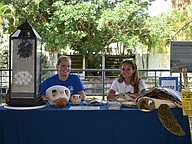- July 26, 2024
-
-
Loading

Loading
Keira, Xiamara, Alana and Celena Eberly had their faces painted.
Volunteer Laurie Schmitt spoke with visitors about composting.
Ava Burton-Harper was happy with her face painting.

Melissa Macksey and Emily Briner were educating visitors on how to keep the beaches turtle-friendly.
Nathan and Phinehas Chetwynd learned that dog poop can pollute our oceans from this fairy.
Eliah, Jennifer, Rafael, Nayomi, Ayden, Joziah and Avriel Garcia
Shaina and Jaxton Johnson check out the touch tank.
Austin and Amelia Horton stand in front of a giant megalodon jaw.
Tira Vandenhoek educates visitors on the impact of dog waste on our oceans.
Mae Monnoc says she loves sharks and believes that with more education, others will too.
Mason Jordan and Ashley Aular offer zinc as an alternative to chemical sunscreens that pollute oceans.
Dana Henderson discusses the dangers of feeding dolphins.
Jiselle Sulinski is on a mission to protect clams.
Price Claypoole stresses the importance of seagrass as a habitat and a climate changer.
Volunteer Catie Larsen helps Vivien Scheufler make a birthday card for Eugenie Clark.
Finley Monnot wore his shark socks to celebrate World Oceans Day.
Charlotte Winemiller plays shark cornhole.
Rebecca Winemiller checks out the coral reef exhibit.
Grayson and Matthew Powell in front of Mote's step and repeat.
Nicholas and Emily Wanza were checking out the tanks.
Julie Henry used to work at Mote and published a book called "Wisdom from the Wild" in January.
Madisyn and Montrel Cox test the hurricane simulator.
Vincent, Clay, Owen and Yvonne Diorides
Mote Marine Laboratory & Aquarium’s mascot, Gilly the Shark, was making the rounds June 11 to celebrate World Oceans Day, and there were lots of happy little faces painted to match. The courtyard was filled with exhibits, games and shark-lovers of all ages.
Mae Monnoc wore her love for sharks on her T-shirt. She was displaying her ocean conservation service project along with five other students enrolled in Mote’s home-schooling program.
The first “shark lady” and Mote researcher, Eugenie Clark, was there in spirit. Guests were provided card-making supplies to wish her a happy birthday.
Educational booths surrounded the courtyard to reinforce Mote’s missions, such as a booth encouraging visitors to leave the beaches turtle-friendly and another that explained how leftover manatee lettuce is composted.
One booth used vinegar to visually explain how coral reefs are being diminished by acidification by dropping a piece of coral into vinegar to watch it bubble and fizz. The oceans soak up carbon dioxide from the air, which makes the water acidic and kills algae and thus corals have trouble forming skeletons. The vinegar was a small and effective simulation of what’s happening in the oceans.
Volunteer Julia Winters called coral reefs the rainforests of the ocean and said Mote has a solution.
“Mote has a red coral that is being bred to be resistant to acidification and temperature extremes,” Winters said. “The big thing is: They’re replacing it.”
Sarasota County Environmental Services set up a booth to combat another problem for the oceans that many people might not consider: dog poop. The sign reading “poo-lution” made the kids giggle but offered some serious numbers.
The county estimates 12 tons of waste is left by the area’s dog population daily. If 40% of owners don’t pick up after their pets, that leaves five tons of “poo-lution” washing into the waterways every day.
The day was a celebration with a message: Our daily habits impact our oceans.